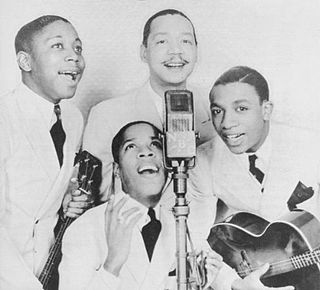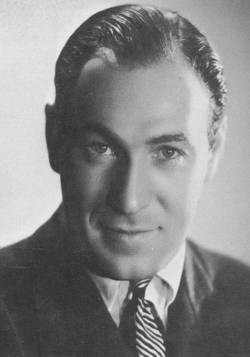
The Ink Spots were an American vocal pop group who gained international fame in the 1930s and 1940s. Their unique musical style predated the rhythm and blues and rock and roll musical genres, and the subgenre doo-wop. The Ink Spots were widely accepted in both the white and black communities, largely due to the ballad style introduced to the group by lead singer Bill Kenny.

Earthbound is the twelfth album by American pop group the 5th Dimension, released in 1975 by ABC Records. It is the last album for the group's original line-up of Billy Davis Jr., Marilyn McCoo, Florence LaRue, Lamonte McLemore and Ron Townson. After touring with the 5th Dimension in support of this album, Billy Davis Jr. and Marilyn McCoo left the group to work as a duo and as solo artists.

The Oak Ridge Boys are an American country and gospel vocal quartet originating in Oak Ridge, Tennessee. The group was founded in 1943 as the Oak Ridge Quartet. They became popular in Southern gospel during the 1950s. Their name was changed to the Oak Ridge Boys in the early 1960s, and they remained a gospel group until the mid-1970s, when they changed their image and concentrated on country music.

Sonny Stitt was an American jazz saxophonist of the bebop/hard bop idiom. Known for his warm tone, he was one of the best-documented saxophonists of his generation, recording more than 100 albums. He was nicknamed the "Lone Wolf" by jazz critic Dan Morgenstern because of his tendency to rarely work with the same musicians for long despite his relentless touring and devotion to the craft. Stitt was sometimes viewed as a Charlie Parker mimic, especially earlier in his career, but gradually came to develop his own sound and style, particularly when performing on tenor saxophone and even occasionally baritone saxophone.
The Swallows were an American R&B group. They are best known for their 1951 recording of "Will You Be Mine", which appeared in the US Billboard R&B chart.

The Jordanaires were an American vocal quartet that formed as a gospel group in 1948. Over the years, they recorded both sacred and secular music for recording companies such as Capitol Records, RCA Victor, Columbia Records, Decca Records, Vocalion Records, Stop Records, and many other smaller independent labels.

The Imperials are an American Christian music group that has been active for over 55 years. Originating as a southern gospel quartet, the innovative group would become pioneers of contemporary Christian music in the 1960s. There have been many changes for the band in membership and musical styles over the years. They would go on to win four Grammys, 15 Dove Awards and be inducted into the Gospel Music Hall of Fame.

A Hot Night in Paris is the only album by the Phil Collins Big Band, released in 1999 by Atlantic Records. Fronted by Genesis lead singer/drummer Phil Collins, the album did not contain any singing. Instead, the album consisted of big band renditions of primarily Collins and Genesis songs, with Collins remaining at the drums.
The Phil Collins Big Band - a side project of English rock drummer, singer and musician Phil Collins - performed in 1996 and 1998.
The Cathedral Quartet, also known as the Cathedrals, was an American southern gospel quartet who performed from 1964 to December 1999. The group's final lineup consisted of Glen Payne (lead), George Younce (bass), Ernie Haase (tenor), Scott Fowler, and Roger Bennett.
"I Pity the Fool" is a soul blues song originally recorded by Bobby Bland in 1961 for his first Duke Records album, Two Steps from the Blues. Many music writers believe that it was written by Joe Medwick, although Duke owner Don Robey appears on the songwriting credits.

Buddy Clark was an American popular singer of the Big Band era. He had some success in the 1930s, but his career truly blossomed in the late 1940s, after his return from service in World War II, and he became one of the nation's top crooners. He died in a plane crash in 1949.
"We're Gonna Groove" is a song written by soul artist Ben E. King and later co-credited to James Bethea. In 1964, it was released as the single B-side of King's rendition of "What Now My Love".

4 Runner is an American country music vocal group founded in 1993 in Nashville, Tennessee. The group initially consisted of Craig Morris, Billy Crittenden, Lee Hilliard, and Jim Chapman. Signed to Polydor Records Nashville, the quartet released its self-titled debut album in 1995. It featured four charting singles on Hot Country Songs, the most successful being "Cain's Blood" at No. 26. Billy Simon took Crittenden's place just before a second album for A&M Records, which was not released despite producing a chart single, and the group broke up afterward. Morris, Chapman, and Hilliard reunited with third baritone singer Michael Lusk to release their next album, Getaway Car, on the Fresh label before disbanding a second time. The group reunited a second time in 2023 with a lineup consisting of Morris, Chapman, Hilliard, and Morris's son Sam. Shortly after their reunion, Hilliard left as well, with Herbie Chapman taking his place.

Live in Concert is a live album by Ray Charles released in 1965 by ABC-Paramount Records. The recording was made at the Shrine Auditorium in Los Angeles, California in September, 1964 following a tour of Japan.
Teddy and the Twilights were a R&B quintet from Philadelphia.

The Du Droppers were an American doo-wop group formed in Harlem, New York, in 1952. Members of the band were experienced gospel singers in ensembles dated to the 1940s, and were one of the oldest groups to record during the era. Among the Du Droppers' most enduring songs are "I Wanna Know" and "I Found Out ", which both reached number three on the Billboard R&B charts in 1953.

The Willows were an American doo-wop group formed in Harlem, New York, in 1952. The group was an influential musical act that performed into the mid-1960s and had a Top 20 R&B hit with "Church Bells May Ring", a song which was covered with greater commercial success by The Diamonds.

The Marquees were an American doo-wop group formed in Washington, D.C., United States, in 1957. Evolving from the former group the Rainbows, the Marquees included Marvin Gaye and backed musicians such as Bo Diddley and Billy Stewart. The group also recorded as the New Moonglows with singer Harvey Fuqua.
Herbie Rich was an American multi-instrumentalist from Omaha, Nebraska, who was a member of The New Breed, The Electric Flag, and the Buddy Miles Express. He also played with Jimi Hendrix, Mike Bloomfield and others.













